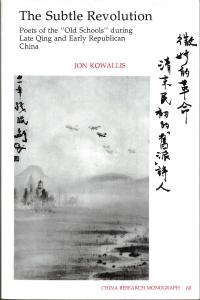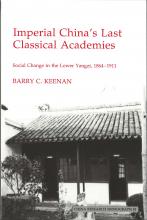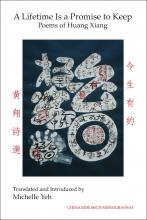The Subtle Revolution
The Subtle Revolution
Jon Kowallis
Kowallis argues that poetry in the classical language allowed its writers and their intended readers to articulate a complex and sophisticated understanding of, as well reaction to, the entry of modernity. The book focuses on representative figures from three schools of poetry prominent from 1871 to 1914, who produced poetry espressing the individual and the cultural dilemmas they faced as citizens of a nation in a life-and-death struggle, not only against outside forces, but also against itself, and did so in a language drawing on a remarkable literary tradition poised on the brink of annihilation.
As a nonprofit academic press, we need your support to publish our books. Your gift can help us make more of our titles available as e-books. DONATE NOW
Title information
Conventional approaches to Chinese literature have presented the late nineteenth century as an era in which the traditional literary forms, particularly classical-style poetry, ground to a halt, having petered out like the political fortunes of the "moribund" Qing dynasty. Only the infusion of new images from abroad and ultimately the language and ideas of the West, it has been held, served to propel Chinese poetry in the direction of the "modern." In this study, Kowallis questions the objectivity of that view, arguing that poetry in the classical language could and did serve its writers and their intended readership as a vehicle to articulate a complex and sophisticated understanding of, as well reaction to, the entry of modernity. The book focuses on representative figures from three schools of poetry prominent in the years 1871–1914, who produced a body of poetry that articulated both the individual and the cultural dilemmas they faced as citizens of a nation in a life-and-death struggle, not only against outide forces, but also against itself, and did so in a language capable of drawing on a remarkable literary tradition poised on the brink of annihilation.
Jon Kowallis
Jon Eugene von Kowallis is currently associate professor and head of the Chinese Studies Program in the School of Languages and Linguistics at the University of New South Wales.
B.A. Cornell University, M.A. University of Hawai'i, Ph.D. University of California, Berkeley
The Subtle Revolution
Preface – vii
Introduction – 1
1. Wang Kaiyun, Deng Fulun, and the “Neo-Ancient” School – 22
2. Fan Zengxiang and Yi Shunding: Late-Qing Allusionists – 71
3. Chen Yan, Chen Sanli, Zheng Xiaoxu, and the “Tong-Guang Style” – 153
Conclusions – 232
Chinese Texts – 246
Glossary of Chinese Terms – 265
Selected Bibliography – 269
Index – 282
|
BLURBS |
|
"The Subtle Revolution tackles a most challenging dimension of Chinese literary modernization. By examining the resurgence of classical-style poetry at a time of radical transformation, Jon Kowallis has ushered us into a world beyond the conventional boundary of the modern. This is a world in which all forces now might emply hitherto incompatible resources and by so doing, renew Chinese literay imagination. Kowallis's readings of select poetry schools and poets are most insightful, and his critique of the extant paradigm prods us to rethink the uncanny conditions of Chinese modernity." ~David Der-wei Wang, Harvard University |
|
"Challenging the received view that the late Qing classical poetry stood at the end of a long glorious tradition, Jon Kowallis argues that it actually marked the beginning of the modern era. Providing sensitive readings and fine translations of the some of the major poets, this book makes an important contribution to the ongoing reexamination of Chinese modernity." ~Michelle Yeh, University of California, Davis |
|
JOURNAL REVIEWS |
|
"Kowallis's work constitutes a kind of "subtle revolution" of its own, shifting our focus away from the "Literary Revolution" and toward the continuing tradition of shih poetry….This is an important contribution to our understanding of modern Chinese literature and history, and one that points the way to the future of the field." ~Daniel Bryant, University of Victoria, in The Journal of Asian Studies 68, no. 3 (August 2009): 939–940 (http://www.jstor.org/stable/20619807) |
|
“Kowallis' book is a refreshing and timely contribution to the study of Chinese poetry. It is a somber reminder of the abuse of such ideas as transnationality in the study of modern Chinese literature in our age of globalisation….The book will prove an invaluable resource for students and scholars of modern and traditional Chinese literature, Qing studies, comparative literature, and Anglo-European poetic traditions interested in comparative study.” ~Alexander C. Huang, Pennsylvania State University, in Journal of the Royal Asiatic Society 19, no. 1 (January 2009): 138–139 (http://www.jstor.org/stable/27756035) |
|
"Kowallis's effort is admirable: he not only fills the gap created by the neglect of the study of classical-style poetry and its creators, all well-known, popular poets in their own time–thus helping us gain a more comprehensive picture of the literary writing of the era–but also, more importantly, locates the missing link between the indigenous poetic form and Chinese literary modernities." ~Shengqing Wu, Wesleyan University, in CLEAR 29 (December 2007): 194–197 (http://www.jstor.org/stable/25478407) |
|
“Obviously the mature fruit of a long interrogation, Professor Kowallis' book is destined to represent a landmark that will open up new perspectives in the study of modern poetry, and will certainly become required reading for the comprehension of Chinese poetry as a whole, that is, both traditional and modern.” ~Victor Vuilleumier, University of Geneva, in CLEAR 29 (December 2007): 192–194 (http://www.jstor.org/stable/25478406) |
|
"In addition to erudite and detailed analysis, Kowallis provides lengthy translations of the significant works. These translated passages—some in fragments, others as whole poems—are an achievement in their own right. As in Kowallis’ earlier work on Lu Xun’s classical style poetry, these translations are a pleasure to read and are meticulously annotated." ~Ban Wang, Stanford University, in China Review International 14, no. 2 (Fall 2007): 491–494 (http://www.jstor.org/stable/23733055) |
|
“Throughout his book, Kowallis strives to counteract the pernicious effect that historical determinism, Chinese and Western, has had on our understanding of this era, namely, the idea that somehow it was ‘inevitable’ that classical (i.e., Chinese) forms had to be rejected and replaced by modern (i.e., Western) forms based on Western models and written in the vernacular (again, on the Western pattern). Over and over, he shows us that the classical poets he studies are just as modern as their May Fourth adversaries….Kowallis's book is a beginning of a long-needed re-evaluation of our entire understanding of the cultural and intellectual history of twentieth-century China.” ~Jerry Schmidt, University of British Columbia, in Pacific Affairs 79, no. 4 (Winter 2006/2007): 682–683 (http://www.jstor.org/stable/40023793) |



